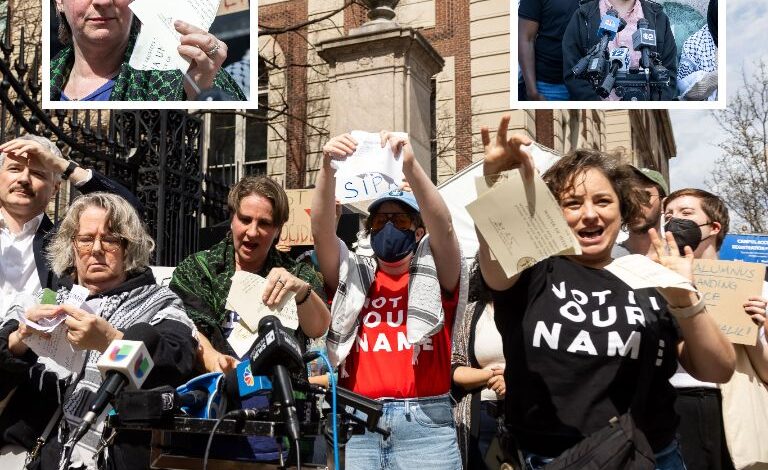‘I’m not a proud alumni at all’

A group of Columbia University graduates made a bold statement over the weekend by tearing up their diplomas on campus in protest of the school and the federal detention of former student and anti-Israel demonstration leader Mahmoud Khalil.
The rally took place during Columbia’s annual Alumni Day celebration, with students and a few dozen School of International and Public Affairs graduates participating in the demonstration. Chanting “Free Palestine,” the group expressed their discontent with the current situation.
Amali Tower, a 2009 SIPA graduate who spoke at the protest and tore up her diploma, shared her perspective with NBC News. She stated, “It’s not easy to do this, with none of us doing this lightly. There’s no joy in this. I’m not a proud alumni at all, and instead I want to stand with the students, and I want to stand with Palestinians, and I want to stand with immigrants who are being rounded up and harassed, oppressed and deported as we speak.”
The protest occurred amidst ongoing turmoil at Columbia, which recently saw its board of trustees remove interim university President Katrina Armstrong during a conflict with the Trump administration. The White House had demanded a ban on facial coverings worn by campus protesters, threatening to withdraw hundreds of millions of dollars in federal aid if the demand was not met.
Although the university complied with some demands from the administration’s Task Force to Combat Anti-Semitism, Armstrong downplayed the policy changes to faculty members. Following Armstrong’s removal, SIPA alumni Claire Shipman was appointed as acting president by the board of trustees.
Despite the leadership changes, the concerns of the Alumni Day protesters remained unaddressed. One alumna named Hannah expressed skepticism about Shipman’s appointment, suggesting that the board of trustees would continue to prioritize their interests over those of the students.
Mahmoud Khalil, the focal point of the protest, was arrested by ICE for his involvement in anti-Israel demonstrations at Columbia. The Trump administration seeks to deport Khalil, citing his alleged ties to Hamas and misrepresentation of information on his green-card application.
The rally saw current and former students advocating for Khalil’s release, with chants and signs calling for “Free Palestine” and “Free Mahmoud Khalil.” A current SIPA student named Sarryeh, who is friends with Khalil, expressed sadness over his legal troubles, highlighting the impact of his absence on the community.
The demonstration at Columbia University reflects the ongoing tensions surrounding free speech, activism, and immigration policies on campus, underscoring the complexities of navigating political and social issues in an academic setting. The world of technology is constantly evolving, and with each new advancement comes the potential for incredible innovation. One area that has seen significant growth in recent years is artificial intelligence (AI). AI has the ability to revolutionize industries, improve efficiency, and enhance our daily lives in ways we never thought possible.
One of the most exciting applications of AI is in the field of healthcare. AI has the potential to transform the way we approach healthcare, from diagnosis to treatment. With the ability to process and analyze vast amounts of data quickly and accurately, AI can help healthcare professionals make more informed decisions and provide better care to patients.
One of the key areas where AI is making a significant impact is in medical imaging. AI algorithms can analyze medical images, such as X-rays, MRIs, and CT scans, to detect abnormalities and assist in diagnosis. This can help to speed up the diagnostic process, leading to earlier detection of diseases and better treatment outcomes for patients.
In addition to medical imaging, AI is also being used to improve patient care and streamline hospital operations. AI-powered chatbots can provide patients with information and support, reducing the burden on healthcare staff and improving the overall patient experience. AI can also help hospitals optimize their resources, such as scheduling appointments and managing inventory, to ensure that patients receive the care they need in a timely manner.
AI is also being used to develop personalized treatment plans for patients. By analyzing a patient’s medical history, genetic information, and other relevant data, AI can help healthcare providers tailor treatment options to each individual’s unique needs. This personalized approach can lead to better outcomes and improved quality of life for patients.
While AI has the potential to revolutionize healthcare, it is not without its challenges. One of the main concerns surrounding AI in healthcare is the issue of data privacy and security. As AI systems rely on vast amounts of sensitive patient data, there is a risk of this information being compromised or misused. Healthcare providers must ensure that robust data protection measures are in place to safeguard patient information and maintain trust in the system.
Despite these challenges, the potential benefits of AI in healthcare are vast. From improving diagnostic accuracy to enhancing patient care, AI has the power to transform the way we approach healthcare and make a real difference in people’s lives. As technology continues to advance, we can expect to see even more exciting developments in the field of AI and healthcare in the years to come.





